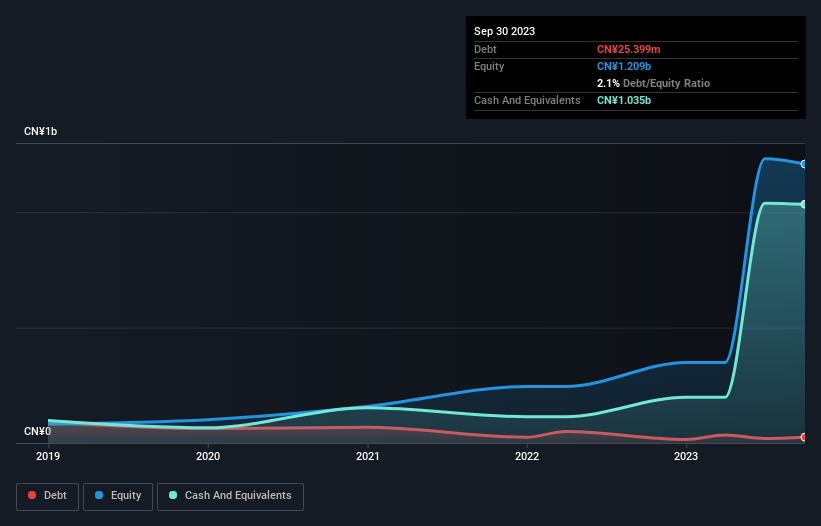Warren Buffett famously said, 'Volatility is far from synonymous with risk.' So it seems the smart money knows that debt - which is usually involved in bankruptcies - is a very important factor, when you assess how risky a company is. We note that Longhorn Auto Co., Ltd. (SZSE:301488) does have debt on its balance sheet. But is this debt a concern to shareholders?
When Is Debt A Problem?
Generally speaking, debt only becomes a real problem when a company can't easily pay it off, either by raising capital or with its own cash flow. In the worst case scenario, a company can go bankrupt if it cannot pay its creditors. However, a more frequent (but still costly) occurrence is where a company must issue shares at bargain-basement prices, permanently diluting shareholders, just to shore up its balance sheet. By replacing dilution, though, debt can be an extremely good tool for businesses that need capital to invest in growth at high rates of return. The first thing to do when considering how much debt a business uses is to look at its cash and debt together.
Check out our latest analysis for Longhorn Auto
What Is Longhorn Auto's Net Debt?
You can click the graphic below for the historical numbers, but it shows that as of September 2023 Longhorn Auto had CN¥25.4m of debt, an increase on CN¥15.0m, over one year. But it also has CN¥1.03b in cash to offset that, meaning it has CN¥1.01b net cash.

How Healthy Is Longhorn Auto's Balance Sheet?
Zooming in on the latest balance sheet data, we can see that Longhorn Auto had liabilities of CN¥523.4m due within 12 months and liabilities of CN¥43.2m due beyond that. Offsetting these obligations, it had cash of CN¥1.03b as well as receivables valued at CN¥324.2m due within 12 months. So it actually has CN¥792.1m more liquid assets than total liabilities.
It's good to see that Longhorn Auto has plenty of liquidity on its balance sheet, suggesting conservative management of liabilities. Due to its strong net asset position, it is not likely to face issues with its lenders. Simply put, the fact that Longhorn Auto has more cash than debt is arguably a good indication that it can manage its debt safely.
On the other hand, Longhorn Auto's EBIT dived 13%, over the last year. We think hat kind of performance, if repeated frequently, could well lead to difficulties for the stock. There's no doubt that we learn most about debt from the balance sheet. But you can't view debt in total isolation; since Longhorn Auto will need earnings to service that debt. So when considering debt, it's definitely worth looking at the earnings trend. Click here for an interactive snapshot.
Finally, while the tax-man may adore accounting profits, lenders only accept cold hard cash. While Longhorn Auto has net cash on its balance sheet, it's still worth taking a look at its ability to convert earnings before interest and tax (EBIT) to free cash flow, to help us understand how quickly it is building (or eroding) that cash balance. During the last three years, Longhorn Auto produced sturdy free cash flow equating to 66% of its EBIT, about what we'd expect. This free cash flow puts the company in a good position to pay down debt, when appropriate.
Summing Up
While it is always sensible to investigate a company's debt, in this case Longhorn Auto has CN¥1.01b in net cash and a decent-looking balance sheet. And it impressed us with free cash flow of CN¥64m, being 66% of its EBIT. So we don't have any problem with Longhorn Auto's use of debt. The balance sheet is clearly the area to focus on when you are analysing debt. However, not all investment risk resides within the balance sheet - far from it. For example, we've discovered 2 warning signs for Longhorn Auto (1 doesn't sit too well with us!) that you should be aware of before investing here.
If you're interested in investing in businesses that can grow profits without the burden of debt, then check out this free list of growing businesses that have net cash on the balance sheet.
New: AI Stock Screener & Alerts
Our new AI Stock Screener scans the market every day to uncover opportunities.
• Dividend Powerhouses (3%+ Yield)
• Undervalued Small Caps with Insider Buying
• High growth Tech and AI Companies
Or build your own from over 50 metrics.
Have feedback on this article? Concerned about the content? Get in touch with us directly. Alternatively, email editorial-team (at) simplywallst.com.
This article by Simply Wall St is general in nature. We provide commentary based on historical data and analyst forecasts only using an unbiased methodology and our articles are not intended to be financial advice. It does not constitute a recommendation to buy or sell any stock, and does not take account of your objectives, or your financial situation. We aim to bring you long-term focused analysis driven by fundamental data. Note that our analysis may not factor in the latest price-sensitive company announcements or qualitative material. Simply Wall St has no position in any stocks mentioned.
About SZSE:301488
Longhorn Auto
Engages in the research and development, design, manufacture, and sale of automotive intelligent driving perception systems in China and internationally.
Flawless balance sheet with low risk.
Market Insights
Community Narratives



